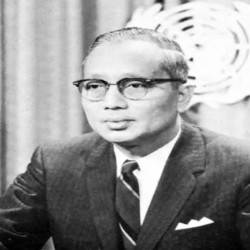
U Thant
Former Secretary-General of the United Nations
| Date of Birth | : | 22 Jan, 1909 |
| Date of Death | : | 25 Nov, 1974 |
| Place of Birth | : | Pantanaw, Myanmar (Burma) |
| Profession | : | Politician |
| Nationality | : | Burmese |
Thant, known honorifically as U Thant, was a Burmese diplomat and the third secretary-general of the United Nations from 1961 to 1971, the first non-Scandinavian to hold the position. He held the office for a record 10 years and one month.
Biography
Thant was educated at the University of Yangon (Rangoon), later the Arts and Science University, where he met Thakin Nu (afterward U Nu, who became prime minister of Myanmar in 1948). The death of Thant’s father (1928) forced him to leave the university before graduation, and he returned to his hometown as a teacher at the National High School and later (from 1931) as headmaster. In 1942 he was secretary to the educational reorganization committee of the government of Japanese-occupied Burma. From 1943 to 1947 he once more was headmaster at Pantanaw.
After World War II Thant was recruited for government service by U Nu and General U Aung San, leader of the Anti-Fascist People’s Freedom League. He was appointed press director (1947), director of broadcasting (1948), and secretary of the Ministry of Information (1949). In 1952–53 he was a Myanmar (Burmese) delegate to the UN, becoming his country’s permanent UN representative in 1957. He was vice president of the UN General Assembly in 1959.
After the death of UN Secretary General Dag Hammarskjöld, the United States and the Soviet Union, failing to agree on a permanent successor, accepted U Thant as a compromise candidate for the acting secretaryship, to which he was elected on Nov. 3, 1961. On Nov. 30, 1962, he was elected permanent secretary general, and he was re-elected for five years on Dec. 2, 1966; he retired at the end of 1971. A devout Buddhist, he sought to apply the principles of detachment and concentration to the solving of international problems.
U Thant died in New York City of cancer, and his body was returned to Yangon for burial. There it became involved in a bizarre tug of war between university students, who seized it on Dec. 5, 1974, and buried it in a hastily built mausoleum in the grounds of the Arts and Science University, and police, who retrieved it by force on December 11, buried it privately, and sealed the tomb in concrete. Subsequent rioting led to the military regime’s declaration of martial law in the city and to several deaths.
Thant wrote (in Burmese) books on the history of cities, the League of Nations, and Myanmar education, as well as a three-volume history of post-World War II Myanmar (1961). A collection of his public addresses and essays from 1957 to 1963 was published as Toward World Peace (1964), and View from the UN (1978), an account of his years as secretary general, was published posthumously.
Quotes
Total 19 Quotes
Every human being, of whatever origin, of whatever station, deserves respect. We must each respect others even as we respect ourselves.
As we watch the sun go down, evening after evening, through the smog across the poisoned waters of our native earth, we must ask ourselves seriously whether we really wish some future universal historian on another planet to say about us: "With all their genius and with all their skill, they ran out of foresight and air and food and water and ideas," or, They went on playing politics until their world collapsed around them.
The war we have to wage today has only one goal, and that is to make the world safe for diversity.
The world will not Change and find peace if there is not a new education.
Governments, systems, ideologies come and go, but it is humanity which remains.
Wars begin in the minds of men, and in those minds, love andcompassion would have built the defenses of peace.
Respect for the truth comes close to being the basis for all morality.
The concept of peaceful coexistence has been criticized by many who do not see the need to make the world safe for diversity. I wonder if they have ever paused to ask themselves the question: What is the alternative to coexistence?
As a Buddhist, I was trained to be tolerant of everything except intolerance. I was brought up not only to develop the spirit of tolerance but also to cherish moral and spiritual qualities such as modesty, humility, compassion, and, most important, to attain a certain degree of emotional equilibrium.
In modern war there is no such thing as victor and vanquished... There is only a loser, and the loser is mankind.
